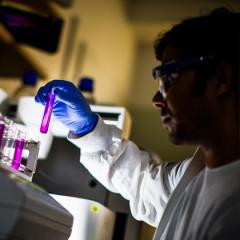A spinout company developing technology based on innovative University of Queensland research has announced two partnerships that could revolutionise the manufacture and delivery of vaccines.
Vaxxas, founded by UQ’s technology transfer company UniQuest in 2011, will partner with global biotechnology company Merck (MSD) and German pharmaceutical manufacturer Harro Höfliger in two separate deals relating to the company’s needle-free vaccine delivery technology.
Merck, a world leader in vaccine development, will access Vaxxas’ HD-MAP technology for the development and manufacture of an undisclosed vaccine.
Merck also retains the option to license the Vaxxas platform for two additional vaccines.
Vaxxas will receive A$18 million (US$12 million) in a combination of equity funding and option fees and is eligible to receive future option, development, and commercial milestone payments.
Vaxxas also announced an alliance with pharmaceutical process engineering and manufacturing company Harro Höfliger to develop a manufacturing line with the potential to produce tens of millions of vaccine-HD-MAP products per week.
Vice Chancellor and President of The University of Queensland Professor Peter Høj said Vaxxas was an excellent example of the translation of UQ’s ground-breaking research at scale.
“With the support of the State and Federal Governments and its investors, the company has grown its base at the Translational Research Institute and is set to build on Australia’s biomanufacturing capabilities, presenting opportunities for export and the creation of high-paying jobs here in Queensland,” Professor Høj said.
“Vaxxas is a very exciting prospect, and I congratulate all involved in the company’s success to date.”
The company’s HD-MAP technology, based on research originating from the Australian Institute for Bioengineering and Nanotechnology, uses tens of thousands of projections that deliver a vaccine to the immune cells just beneath the skin’s surface.
This approach could significantly reduce the need for vaccine refrigeration and storage and result in the production of more patient doses from limited quantities of vaccine.
Media: Esther Haskell, UniQuest Communications, e.haskell@uniquest.com.au, +61 7 3365 7480, +61 409 767 199.


